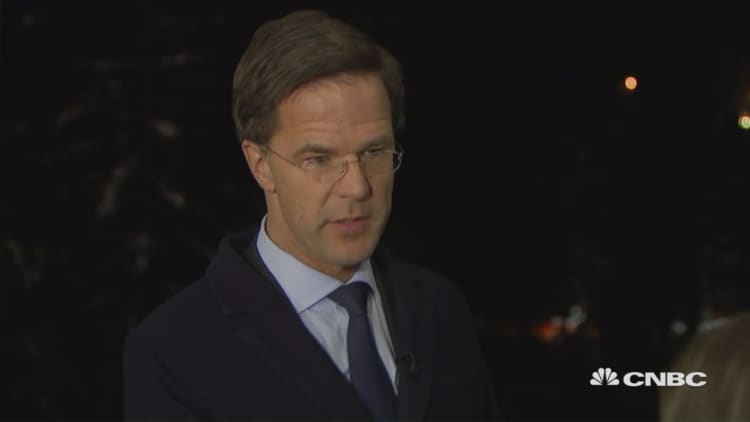The French presidential election is grabbing all the headlines in Europe, but another contest may serve as an indicator for France's election — and Europe's future.
The Netherlands is scheduled to hold a general election on March 15, and right now the race is a dead heat between Geert Wilders — leader of the populist Party of Freedom (PVV) — and incumbent Prime Minister Mark Rutte, who leads the more moderate People's Party for Freedom (VVD).
Markets will be watching the Dutch contest not just to get a sense of who may win the French election, but to gauge the likelihood of the European Union's disintegration.
"That could be the canary in the coal mine," said Art Hogan, chief market strategist at Wunderlich Securities, referring to the Dutch election. "This could be a preview of what could happen in the French election."
The election will test the health of euroskepticism within a core member of the EU.Adriano Bosonisenior Europe analyst, Stratfor
The European stock market has been on a tear this year, with the pan-European Stoxx 600 index advancing 3 percent on the back of a strong economy. The index has gained more than 9 percent over the past year. However, the destabilization of the European Union could send shock waves through markets.
"The blase market reaction is because it's not a core economy like France or Germany, but it does set the table for the rest of the year," said Jasper Lawler, senior market analyst at London Capital Group. "There's also a consensus that they won't be able to form a [coalition]. I think that's why nobody's too worried."
"But even though I don't see an upset here, I do think markets are underpricing risk here," he said.
The Netherlands has the sixth-largest economy in the European Union, with a GDP of around $735 billion in 2016.
Wilders, much like France's more well-known populist Marine Le Pen, has won over voters through his anti-European Union and anti-Islamic rhetoric. Wilders called for a Dutch referendum on EU membership last year immediately after the United Kingdom voted to leave the union.
But there are important differences between Le Pen and Wilders, said Adriano Bosoni, senior Europe analyst at Stratfor, a geopolitical advisory firm. He said that Wilders' approach to economic policy is more open, while Le Pen takes a more protectionist approach.
A win for Wilders would raise questions about the Netherlands' and EU's futures, but he and the Party of Freedom still have several obstacles to overcome if they want to achieve their goals.
First, a Friday sampling conducted by Dutch pollster Peil.nl found that Wilders' PVV was on track to win 25 of 150 seats in parliament, with Rutte's VVD on pace to win 24 seats. The poll also showed five other parties on pace to win at least 10 seats.
That said, polls over the past 18 months have been terrible at predicting actual results — globally.
Polls heading into last year's Brexit vote and the U.S. presidential election were almost all wrong, shocking financial markets and establishment voters alike.

Second, even if Wilders' party wins, it will have a hard time finding allies in parliament. "It's going to be very hard for them to form a coalition because of their toxic rhetoric," said Cloe Ragot, a researcher at Eurasia Group.
Before founding the PVV, Wilders was a member of Rutte's center-right party, but he left in 2004 over a disagreement with the rest of the VVD on EU membership negotiations with Turkey, a country dominated by Sunni Muslims. The VVD endorsed the negotiations; Wilders was against them.
The third obstacle the PVV faces is the Dutch Constitution itself, Eurasia's Ragot said. "To make a referendum [on EU membership], you'd need to change the constitution, and to do that you'd need a two-thirds majority vote in parliament."
All that said, the populist movement in the Netherlands still has a slim chance of moving forward with its agenda, Ragot added. She said Rutte's VVD party could, in fact, form a coalition with the PVV if Wilders' party wins with at least 30 percent of the total vote.
Nevertheless, Stratfor's Bosoni said, "The election will test the health of euroskepticism with a core member of the EU."
Correction: The Netherlands is scheduled to hold a general election on March 15. An earlier version mischaracterized it.


